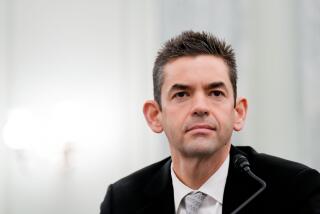Senate Kills Bid to Halt U.S.-Russia Space Station
- Share via
WASHINGTON — In the first congressional action on the proposed U.S.-Russia space station, the Senate on Tuesday endorsed the Clinton Administration’s controversial plan to build the international orbiting space laboratory.
The 59-40 vote killed an amendment offered by Sen. Dale Bumpers (D-Ark.) that would have halted the program by slashing the $2.1 billion space station budget for fiscal 1994 to only $500 million to cover shutdown costs. The money was included in a $14.6-billion appropriation for the National Aeronautics and Space Administration, which the Senate continued to debate Tuesday night.
The Senate’s decision allows NASA to continue negotiations with Russian space officials to develop a new, jointly built space platform to carry out microgravity and biological research. NASA has set a Nov. 1 deadline for agreement on details of the new design. The House already has approved the 1994 budget for the old space station program.
“I am thrilled,” NASA Administrator Daniel S. Goldin said after the Senate vote. “We have some work to do with the Russians in the weeks ahead . . . and, hopefully, we’ll be able to work something out that the Congress will be comfortable with.”
Bumpers’ reaction was equally dramatic. “I’m discouraged almost to the point of despondency,” said the Arkansas senator, who failed for the fifth time in his effort to kill the space station.
President Clinton and Vice President Al Gore telephoned wavering lawmakers Monday and Tuesday, and wrote letters to senators strongly backing the program.
California Sens. Dianne Feinstein and Barbara Boxer both voted to support the project. Boxer had been a consistent critic of the program when she served in the House of Representatives.
The space station program has been strongly supported by California’s beleaguered aerospace industry, which has been badly hurt by major cuts in defense spending.
The state is home to two major space station contractors--McDonnell Douglas Aerospace in Huntington Beach, and the Rocketdyne Division of Rockwell International in Canoga Park, as well as a host of subcontractors. About 5,000 Californians are working directly on the space station.
During 14 hours of debate over two days, Bumpers and other critics argued that the new deal with the Russians puts the Congress in the position of spending billions of dollars on a project that has no final design or cost estimates.
“You can’t dance at two weddings,” said Sen. Paul Wellstone (D-Minn.). “This is a test about whether we’re serious about deficit reduction.”
The critics argued that the shaky nature of the Russian democracy, underscored by President Boris Yeltsin’s decision Tuesday to dissolve the Russian parliament, will make the Russian Federation an unreliable partner in a complex space venture. And they said the Russian space program “is in shambles.”
But supporters said the space station is a project the United States cannot afford to abandon, even in tough economic times.
“The quest for knowledge, the curiosity about the unknown almost always seems to pay off in the future beyond anything we anticipate,” said Sen. John Glenn (D-Ohio), who in 1961 became the first American to orbit the Earth.
In a remarkable turnabout, Sen. Tom Harkin (D-Iowa), a consistent opponent, said the decision to include the Russians has turned him into a solid supporter.
“This new plan would make a major contribution toward stabilizing the Russian government,” said Harkin. “And if we don’t buy the Russian hardware, they’re going to be selling it to other countries.”
More to Read
Sign up for Essential California
The most important California stories and recommendations in your inbox every morning.
You may occasionally receive promotional content from the Los Angeles Times.













